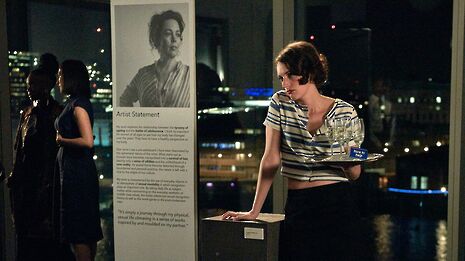Moral trauma in Fleabag: a tragicomical retrospective
Having subverted tropes and won a BAFTA, Phoebe Waller-Bridge’s remarkable first season tempts Daniel Gayne to look back and reflect on what made it a standout, somewhat twisted, comedic hit


Watching the first few episodes of Fleabag, BBC3’s breakout comedy of last year, one could be forgiven for thinking that the show is merely the latest in a tradition of fatalist British sitcoms centred on the dismal life of a tragicomic protagonist. The formula is essential to the DNA of British situational comedy, with great writers from Ben Elton to Graham Linehan seemingly engaged in a sadomasochistic competition to see who can humiliate their protagonist more thoroughly. As any TV critic will declare, Phoebe Waller-Bridge’s script, based on her stage play of the same name, is an adept and particularly bleak take on this classic formula, foul-mouthed funny from beginning to end. What has been commented on much less is the under-appreciated dramatic achievement of Waller-Bridge’s show, which sets it apart from ordinary black comedies.
The series takes us on a dismal journey through the life of the eponymous-yet-anonymous protagonist, who runs a café in terminal decline, is manipulated by her sister’s bastard husband, and fills the void with a parade of meaningless sexual encounters. Through this dismal journey, there are few characters to sympathise with, besides Fleabag herself, whose deadpan wit saves one’s will to live. The writing adeptly crafts a classic tragicomic character in Fleabag; she is by no means perfect, but she is likable and we feel her pain. Were this its sole achievement, it would likely not have lingered in my mind so long, and would have joined the ranks of Black Books on my imaginary shelf of wickedly funny British comedy shows. Instead, Fleabag is transformed in its fantastic season finale into an exhilarating and challenging comic drama through its use of two very common – one might even say played out – plot devices: the fourth wall break, and the plot twist.
“As Fleabag fucks her way around London’s population of middle-class arsehole men, one cannot help but laugh.”
The former is typically used to acknowledge the pretence of fiction in comedy. When the technique is used in Miranda for example (a show to which Fleabag is often, very superficially, compared to), it acknowledges the very real audience in the live studio; in The Office, it acknowledges the presence of the ‘documentary film crew’. But here it serves a different purpose, one integral to the payoff which comes with the show’s twist ending. Rather than a subversion of the fictional world, the fourth wall break expands it, making the audience a symbolic ‘extra’ in the show. Indeed, by withholding important information from us, and thereby setting us apart from the other central characters in Fleabag’s life, we are made to be a very particular kind of character. We are the ones who do not know her, the ones to whom she performs, the ones that the act is for. We are, quite literally, Fleabag’s audience. We gasp at her shenanigans and giggle at her crudity – and, as one does with all great tragicomic protagonists, we sympathise with her when she falls, fails, or is made a fool of.
It is precisely because of this relationship that, come the season finale, we cannot help but drop our jaws to the ground at the pivotal plot twist. We learn early in the season that Fleabag’s best friend, Boo, died tragically in a semi-intentional road traffic accident (the intention was to be injured, not suicide), designed to get back at her cheating boyfriend. This knowledge sets the scene for Fleabag’s depressive, empty lifestyle. While throughout the show, Fleabag experiences brief flashbacks of an enigmatic trauma, nothing more of substance revealed, until the finale, where two-and-two are put together and we discover that the burden Fleabag bears is one of guilt. Through a confrontation with her sister, we learn that Fleabag is the person that Boo’s boyfriend slept with. Unbeknownst to us until the very last, Fleabag is not a story of personal tragedy, or of struggle against a callous, uncaring world, but one of deep and complex moral trauma.

The result is a visceral emotional gut-punch, given extra force by simple and effective staging. In that moment we see Fleabag forced to confront a truth which, in every prior episode, she has squirmed away from. In a sequence, intercut with flashbacks, Fleabag once again breaks the fourth wall – no dialogue this time, no confident cheek, only darting eyes and a face the very picture of shame. She turns to flee, and is confronted, once again, by our shocked glare. In this moment we realise that we, her obedient, cackling audience, the extra in the drama of her life, were her crutch, her enabler, as she groped her way along using wisecracking humour as a defence mechanism against her legitimate guilt for her friend’s death. As Fleabag fucks her way around London’s population of middle-class arsehole men, one cannot help but laugh at the same callous naughtiness that is at least tacitly responsible for Boo’s death.
“She is an individual who has made some fairly dire ethical missteps, which haunt her throughout.”
Re-watching Fleabag is a very different experience: it is still funny, of course, but this time one sees all the foreshadowing becoming painfully resonant, almost difficult to watch. Even more noticeable is that the most sympathetic of those around her, the ones that always knew what we did not, rarely see the funny side of Fleabag’s wisecracking. When they enquire about her well-being they do so not with polite interest, but with the sincere and anguished concern one has for a deeply troubled friend. Waller-Bridge’s character is not ‘unlikable’, as one Guardian commentator described her. Quite the contrary: the show, and its ultimate dramatic payoff, is built around our liking her. But it is hard to avoid, come the finale, that she is an individual who has made some fairly dire ethical missteps, which haunt her throughout the series. With the combination of these two very simple storytelling tools, Fleabag transforms its lead from a standard tragic lead to a desperate yet morally ambiguous character, and doing so forces the audience to recognise its complicity in her failing to come to terms with her trauma.
In the final scene, played out between Waller-Bridge and Hugh Dennis (a depressed banker who agrees to re-open Fleabag’s loan application to save her café), the knife-edge between comedy and tragedy that makes the show so brilliant is exemplified in a sparse and understated interaction. “People make mistakes,” says Dennis, to which Fleabag – quoting the late Boo – responds: “That’s why they put rubbers on the ends of pencils.” Dennis asks if that is a joke, to which Fleabag eventually replies, with uncharacteristic seriousness: “I don’t know.” The beauty of the show is that we are not too sure either
 News / Cambridge academics sign open letter criticising research funding changes22 February 2026
News / Cambridge academics sign open letter criticising research funding changes22 February 2026 News / Supporters protest potential vet school closure22 February 2026
News / Supporters protest potential vet school closure22 February 2026 News / University Council rescinds University Centre membership20 February 2026
News / University Council rescinds University Centre membership20 February 2026 News / Hundreds of Cambridge academics demand vote on fate of vet course20 February 2026
News / Hundreds of Cambridge academics demand vote on fate of vet course20 February 2026 Comment / A tongue-in-cheek petition for gowned exams at Cambridge 21 February 2026
Comment / A tongue-in-cheek petition for gowned exams at Cambridge 21 February 2026








